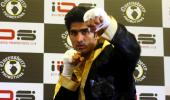The night before Dr Singh was to meet President Bush, he said he could not sign the agreement.
Aziz Haniffa/Rediff.com reports on the tense hours before July 18 dawned.

Condoleezza Rice, then Secretary of State and President George W Bush's most trusted and closest confidante, in her video address to participants at the Carnegie conference on the Future of the Indo-US Partnership: Ten Years After the Civil Nuclear Cooperative Initiative, ignited a fascinating conversation on the near death moments on the eve of the Indo-US nuclear deal agreement, with then Indian foreign secretary Shyam Saran and then national security adviser M K Narayanan, providing insights that clearly proved the US wanted the deal much more than did India.
Dr Rice recalled that the agreement announced on July 18, 2005, "experienced a number of near death moments," and noted how the "night before the agreement, we received word that Prime Minister (Dr Manmohan) Singh would not sign the deal."
"The prime minister's willingness did not come without a cost," Dr Rice said, but argued that "the outcome has surely been worth the effort."
"It has helped an energy hungry India and it has enabled greater international investment in the civil nuclear industry," Dr Rice added.
She predicted that "India would continue to play a central role," regionally and globally. And the US and India were now working in concert "on a wide range of issues," particularly "as the global economy becomes increasingly knowledge based."
Saran -- during the first session on Looking Backward, Looking Forward, which kicked off the full-day parleys, packed with virtually all of the protagonists who were involved in the deal -- recalled the night before the agreement was signed, Dr Rice had come to then external affairs minister K Natwar Singh's hotel suite, saying she wanted to meet the prime minister, because he had indicated that he intended to call off the deal.
The bone of contention, Saran remembered, "were some additional elements that we had not agreed upon for example, like India wanted to make the decision, which of its nuclear plants it would offer for safeguards... not safeguards that are applicable to Non-Nuclear Weapons States."
There was also the issue of the number of Indian reactors that could be exempt from international safeguards with the US pressing for virtually all but two reactors to be left out from these intrusive measures.
A deep sense of apprehension had suddenly set in, Saran recalled. "Just as one is talking about unease on the US side, there was also deep unease on the Indian side."
"I mean, this was unchartered territory in which you were headed. You didn't quite know exactly where it was going to take you."
Suddenly, Saran said, this was "not just the issue of nuclear cooperation because... don't forget that India had been at the receiving end of almost 30 years -- since 1974 -- of very, very harsh US sanctions against our space programme, our nuclear programme, our defence, research and development programmes."
"So these are people who had to bear the brunt of what was that negative phase of India-US relations" negotiating an unprecedented deal, "and so, it should come as no surprise that they were very sceptical that suddenly the US had changed and was willing to be a partner, after having been a rather -- the spoilsport -- for a number of years."
"It took a lot of effort to try and convince people that this was for real -- that this was something that was a positive thing," Saran said, and now the Indian delegation was faced with these new US demands.
He disclosed that he had then "conveyed to (then US Undersecretary of State and the pointman for the nuclear deal R Nicholas) Nick (Burns) that evening that 'I'm sorry, we are not in a position to go ahead with this, and maybe we can just settle for a formulation, which says that India and the United States have agreed to continue discussions on civil nuclear energy cooperation and leave it that, and not have the elaborate paragraph that we had so painstakingly negotiated'."
"It was then that Secretary Rice called in the morning and said she wanted a session with our prime minister, but the prime minister at that time was not so keen to have this meeting and face some embarrassment," Saran remembered.
But Dr Rice, he recalled, was unrelenting. "She basically asked, 'Tell me, what is it that's worrying you, what is it that you would like to see changed, because we really want this to go through'."
At that point, Saran said "Foreign Minister Natwar Singh took Secretary Rice to the prime minister and said there is a possibility of making a few changes."
Consequently, he noted that some frantic consultations were held, including with then chairman of the Indian Atomic Energy Commission, "who was also part of the delegation and then it was agreed that some language would be tweaked, which was what we started to do afterwards."
"So, that was a moment of crisis, but it was overcome and all credit is due to Secretary Rice that she actually took that initiative," Saran said, and noted, "what this points to is -- and subsequently this is something we faced on a number of occasions -- where we came across almost insuperable obstacles, it was really the personal intervention of President Bush on one side and Prime Minister Manmohan Singh on the other, which enabled us to overcome some of these obstacles."
"I know that for various reasons, a view has been widely imparted that on the night of July 17, Prime Minister Manmohan Singh called off the deal," Narayanan added.
"There were very valid reasons and part of the reason for all this is a lot of negotiations on the Indian side was also being done," he added.
These negotiations were "not only between the State Department and the MEA, but (also with) the President's office, the NSA Steve Hadley, the Prime Minister's Office, the Atomic Energy Commission."
"Perhaps the most hostile element of the entire negotiating strategy was as suspicious of the MEA as they were of the American establishment, I would say," Narayanan said.
"So the point is Dr Manmohan Singh said at that time we will not go ahead because he felt the deal was not... there was an understanding that had been reached between the President's office that the number of (Indian) reactors that would be kept out of safeguards would be such and such."
"And at the State Department -- Nick was a great exception to that rule, I would say -- had a lot of people who wanted to teach India a lesson," Narayanan said.
"By the time the visit was due, the number that was agreed on six to eight was reduced to two. That figure was totally unacceptable to the MEA."
"And, therefore, the decision that night was... the prime minister's words, which I might use, at 12.05 that if the chairman of the Atomic Energy Commission and the national security advisor are not willing to go along with the figure, let's call it off."
Narayanan said when this news reached the White House, President Bush sent Dr Rice to meet with the prime minister to resurrect the deal.
If Prime Minister Singh "was not for the deal," he said, "this deal wouldn't have gone through. But there was some amount of misadjustment or misunderstandings of what amount of the figures (regarding reactors under safeguards)."
"To the credit of the American side," Narayanan said, "they went back and came back with whatever figure was acceptable."
"I know that Natwar Singh has written that the prime minister technically called it off and I think put it very mildly that there was acrimony par excellence on our side."
But, Narayanan asserted, "The point is I want history to record that this deal would not have gone through. At least from the Indian side without Manmohan Singh being 150 per cent for the deal just as if President Bush was not for it."
"You can't get a big deal," he argued, "unless the top leaders, who sort of steer the destiny of their country at the time, are willing to do the deal."
"President Bush and Prime Minister Manmohan Singh," Narayanan said, "were unwavering that the nuclear deal was fundamental to the relationship."
Image: Dr Condoleezza Rice, then Secretary of State in the George W Bush administration, greets Prime Minister Manmohan Singh at the White House, July 18, 2005. Photograph: Paresh Gandhi/Rediff.com










